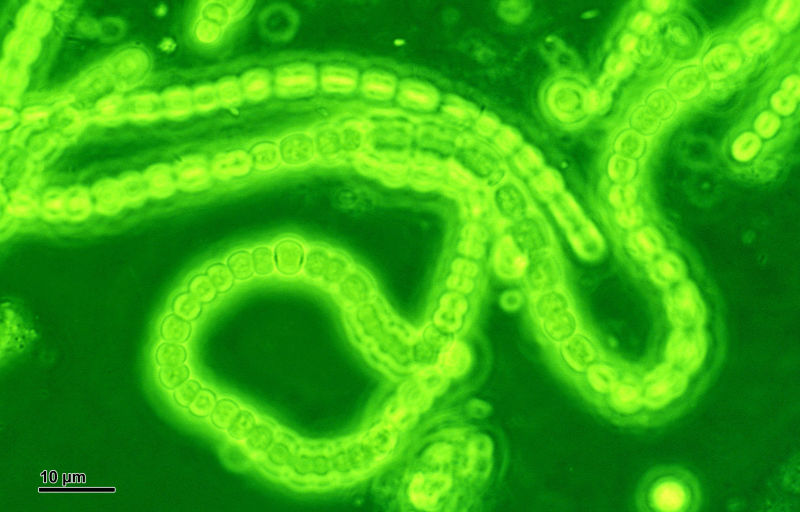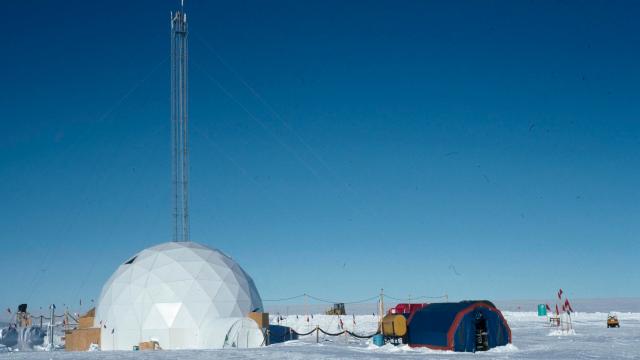It’s nothing to lose sleep over — really, I promise — but Earth’s atmosphere is leaking oxygen. Atmospheric oxygen levels have dropped by 0.7 per cent over the past 800,000 years, and while scientists aren’t sure why, they’re rather excited about it.
Field site where the famous Vostok ice cores, which the present study uses, were drilled in Antarctica. Image: Michael Bender
“We did this analysis more out of interest than any expectation,” Princeton University geologist Daniel Stolper told Gizmodo. “We didn’t know whether oxygen would be going up, down, or flat. It turns out there is a very clear trend.”
Atmospheric oxygen levels have changed dramatically over Earth’s history, but getting hard numbers to build out the record has proven extraordinarily difficult. We know that for the first few billion years, our atmosphere didn’t have oxygen at all. Then, tiny green algae called cyanobacteria evolved and flooded the skies with the stuff, triggering an apocalypse for oxygen-intolerant life forms.
As plant life evolved and spread, oxygen continued to accumulate in our atmosphere, until eventually, there was enough to support complex animals. For the past few hundred million years, things have been pretty stable, and animal life has thrived.
But these broad brushstrokes aside, scientists also know that oxygen is incredibly dynamic. Animals like us consume oxygen every second, while plants produce fresh oxygen as a by-product of photosynthesis. On longer timescales, oxygen is slowly eaten up by the weathering of silicate rocks.
“Every thousand years or so, all of the O2 [in our atmosphere] is turned into water and then back into O2,” Stolper said. “But there’s an ever so slight leak over time, in terms of extra production or consumption.”
Given enough time, that leak can become significant. It can even change the habitability of a planet. And so, Stolper, along with Princeton’s John Higgins and several other collaborators, decided to see if the leak could be measured.

Cyanobacteria, planet Earth’s first terraformers. Image: Doc. RNDr. Josef Reischig, CSc. / Wikimedia
To do that, they turned to one of the best oxygen records we have — ice cores from Greenland and Antarctica, which contain trapped air bubbles representing snapshots of our atmosphere over the past million-odd years. By examining the ratio of oxygen to nitrogen isotopes within these cores, the researchers were able to pull out a trend: Oxygen levels have fallen by 0.7 per cent over the past 800,000 years, meaning sinks are roughly two per cent larger than sources.
Writing today in Science, the researchers offer a few possible explanations. For one, erosion rates appear to have sped up in recent geologic history, causing more fresh sediment to be exposed and oxidised by the atmosphere, causing more oxygen to be consumed. Long-term climate change could also be responsible. Recent human-induced warming aside, our planet’s average temperature had been declining a bit over the past few million years.
“As you cool the oceans, the solubility of oxygen goes up,” Stolper explained. “That means you oxidize more organic carbon [in the ocean] and you have less to put back in the atmosphere.”
Stolper added that there could be other explanations, too, and figuring out which is correct could prove quite challenging. But learning what controls the knobs in our planet’s oxygen cycle is worth the effort. It could help us understand what makes a planet habitable at all — something scientists are rather keen on, given recent exoplanet discoveries.
Stolper’s analysis excluded one very unusual part of the record: The last 200 years of industrial human society.
“We are consuming O2 at a rate a factor of a thousand times faster than before,” Stolper said. “Humankind has completely short-circuited the cycle by burning tons of carbon.”
While Stolper reassured Gizmodo that we’re still not going to run out of breathable air any time soon, “it’s yet another indication of our collective ability to do what happens [naturally] on the Earth, yet so much faster.”
[Science]
